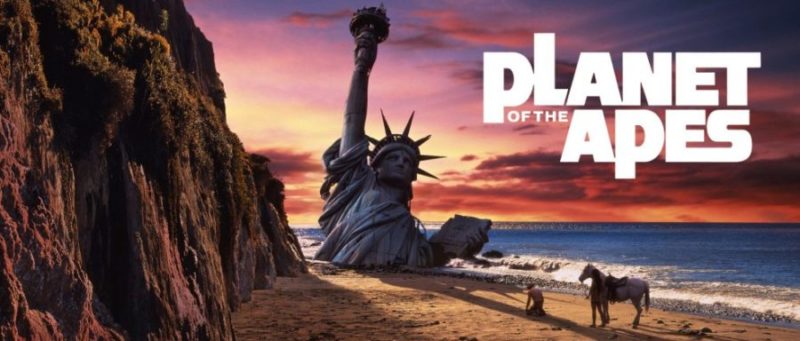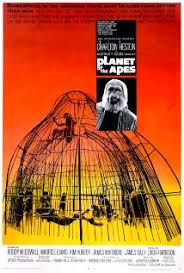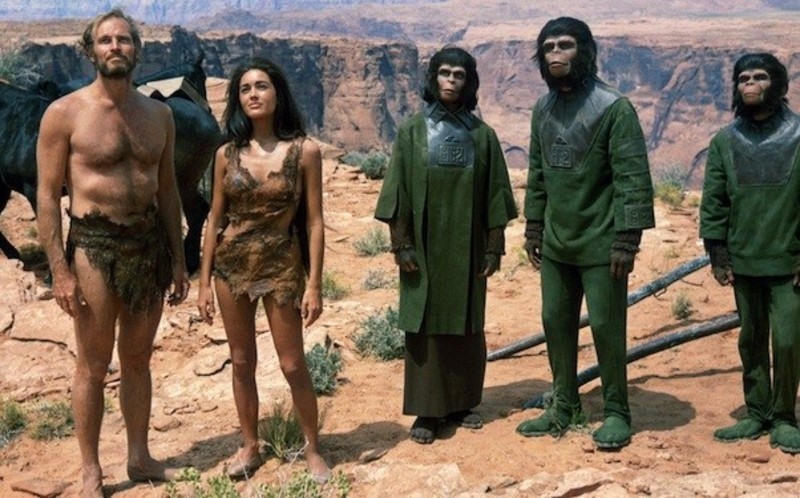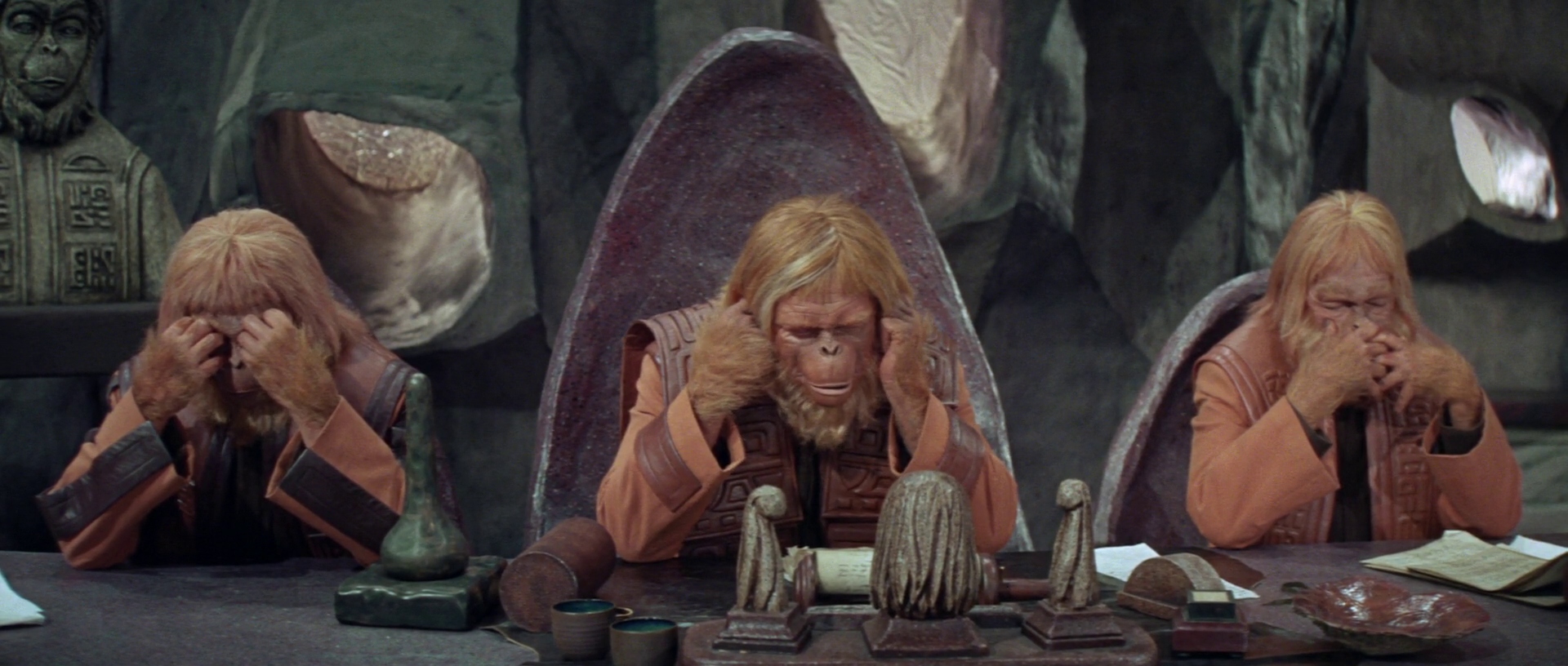
Retro Review: Planet of the Apes (1968)
Director: Franklin J. Schaffner
Writers (Screenplay): Michael Wilson and Rod Serling
Writer (Novel): Pierre Boulle
Starring: Charlton Heston, Roddy McDowall, Kim Hunter
A review by Stacy Dooks
 Earth; Earth; the planet was Earth the whole time.
Earth; Earth; the planet was Earth the whole time.
While the original Planet of the Apes film easily has one of the most spoiled endings in cinematic history (probably third in line after The Empire Strikes Back and Citizen Kane), this should by no means deter curious viewers who haven’t seen the 1968 classic. Indeed, upon further viewing I found a number of interesting facets to the original film, which I intend to discuss here in greater detail based not only on their own merits but in contrast to the recent trilogy of Apes films.
How does the original stack up to the current crop? Is it worthy of addition to the sacred scrolls or should it be exiled to the Forbidden Zone?
Directed by Franklin J. Schaffner and written by screenwriters Michael Wilson and Rod Serling (creator of the legendary television series The Twilight Zone), Planet of the Apes was based upon French novelist Pierre Boulle’s eponymous novel. But in the grand tradition of Hollywood adaptation, little more than the initial concept (a planet where simians evolved into the dominant species) was retained and an entirely new story was crafted.

In Planet of the Apes, George Taylor (Charlton Heston) is an astronaut on a mission in deep space, sent to find a new planet and to colonize it (best of luck with only three men and one woman on the trip). The ship crash-lands into a lake and sinks, but a last-minute glance at the chronometer reveals their cryogenic sleep lasted two thousand years, and everything back on Earth is long gone. Not that any of that bothers Taylor. Hell, even the death of their female crewmate doesn’t really put him out that much. Taylor is a nihilist of the first rank, a misanthrope who wants to get away from humanity. His fellow astronauts Dodge (Jeff Burton) and Landon (Robert Gunner) are much more sympathetic, but given that you already know who makes it to that final scene on the beach you can probably guess how they make out in this film (spoiler alert: very, very poorly).
Our heroes wind up separated and captured by the titular Apes, and Taylor’s throat is injured rendering him as incapable of speech as the native human beings they’ve encountered who steal their Earthly accoutrements (their clothes, supplies, and weapons). Taylor winds up in the care of Zia (Kim Hunter), a scientist whose theories on both simian evolution and human intelligence are frowned upon by the ruling Orangutan council headed by Dr. Zaius (Maurice Evans). Taylor encounters the lovely Nova (Linda Harrison) whom Zia intend to pair off with Taylor (or as she calls him, “Bright Eyes”) in order to breed more intelligent humans for study. Taylor eventually reveals himself as a human who can not only think, but speak as well. And speak he does, in one of the most famous lines in all of science fiction. Ladies and gentlemen, my Charlton Heston voice:
“TAKE YOUR STINKING PAWS OFF ME, YOU DAMNED DIRTY APE!”
Thank you, thank you. No applause, please. Simply throw money.
Taylor reveals the truth of his situation to Zia, whose husband Cornelius (Roddy McDowall) is initially skeptical. However, as an archaeologist, he can’t deny that he’s found some ruins in the Forbidden Zone which might indicate that there was an earlier, more advanced epoch of Ape civilization where humans might have been more intelligent. Zia is put on trial for her heretical stance of placing science above ruling doctrine, and Taylor is quickly dismissed as an abomination, a mutation to be destroyed. With time running out, Taylor, Nova, and his simian allies escape for a desperate flight to the Forbidden Zone… and the truth that could destroy everything.

Planet of the Apes is a remarkable film. The special effects are top-notch for the period, and the makeup work for the apes is absolutely brilliant here in the debut installment. Heston may devour the scenery at times but you can’t deny the man’s presence on screen. He makes Taylor a misanthropic monster who you alternately loathe and root for. The film doesn’t give you a hero arc like the current Apes films do with Caesar. Taylor has moments of brutality and savagery to him, and even the ‘enlightened’ Apes treat Taylor as little more than a clever pet at first.
Of course, the movie is the product of a less enlightened time, and it should be noted that the only human female character has no lines at all. The sole speaking simian female, while a respected scientist, is repeatedly mansplained to by the ruling orangutans at every opportunity.
The film has a message about blind adherence to dogma stagnating a society, but also how that dogma might have at least a basis in good intention. Even the film’s antagonist figure of Dr. Zaius shows moments of genuine empathy and compassion. Planet of the Apes is a film that challenges the audience, that doesn’t allow for easy answers. And this one is easily the most upbeat film of the series. If I get the chance, let me spin you the tale of Beneath the Planet of the Apes. If this film’s tone is John Lee Hooker blues, its sequel is a Leonard Cohen album.
The Verdict
See it. Should you watch Planet of the Apes? Definitely. It’s a cornerstone of science fiction, easily the first major blockbuster before Jaws or Star Wars. The franchise spawned sequels, comic books, television shows, cartoons, action figures and a plethora of merchandise. It’s been riffed on and parodied by everyone from Mel Brooks to The Simpsons (admit it, every time you read the name, you hear “DR. ZAIUS! DR. ZAIUS!” from that infamous episode). As I mentioned, its ending is one of the most open secrets in pop culture. But it’s far, far more than a man screaming on his knees on the beach. The movie uses a simian society to put our own beneath the microscope. It asks hard questions about who we are, who we’d like to be, and what we fear we might become. It deserves a place in the collection of every science fiction fan.

![[REVIEW] PROPHET #1 RE-MASTERED EDITION](https://geekd-out.com/wp-content/uploads/2022/07/0CD17CDB-4D66-4033-91BC-FBB5E2C762AE-150x150.jpeg)

![[REVIEW] DEFENDERS #1](https://geekd-out.com/wp-content/uploads/2021/08/defenders-1-feat-150x150.jpeg)
One thought on “Retro Review: Planet of the Apes (1968)”